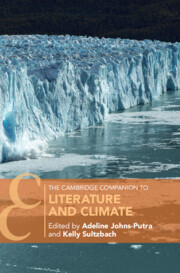Book contents
- The Cambridge Companion to Literature and Climate
- The Cambridge Companion to Literature and Climate
- Copyright page
- Contents
- Figures
- Notes on Contributors
- Introduction
- Part I Historical Shifts in Climate Consciousness
- Part II Current Issues in Climate Change Criticism
- Part III Ways of Telling Climate Stories
- Part IV Dialogic Perspectives on Emerging Questions
- Science Fiction and Future Fantasies
- Collective Climate Action
- 13 Indigenous and Black Feminist Knowledge-Production, Speculative Science Stories, and Climate Change Literature
- 14 More-than-Human Collectives in Richard Powers’ The Overstory and Vandana Singh’s ‘Entanglement’
- Love Letters to the Planet
- Diverse Indigenous Voices on Climate
- Redefining ‘the Real’
- Selected Bibliography
- Index
- Cambridge Companions to …
13 - Indigenous and Black Feminist Knowledge-Production, Speculative Science Stories, and Climate Change Literature
from Collective Climate Action
Published online by Cambridge University Press: 31 March 2022
- The Cambridge Companion to Literature and Climate
- The Cambridge Companion to Literature and Climate
- Copyright page
- Contents
- Figures
- Notes on Contributors
- Introduction
- Part I Historical Shifts in Climate Consciousness
- Part II Current Issues in Climate Change Criticism
- Part III Ways of Telling Climate Stories
- Part IV Dialogic Perspectives on Emerging Questions
- Science Fiction and Future Fantasies
- Collective Climate Action
- 13 Indigenous and Black Feminist Knowledge-Production, Speculative Science Stories, and Climate Change Literature
- 14 More-than-Human Collectives in Richard Powers’ The Overstory and Vandana Singh’s ‘Entanglement’
- Love Letters to the Planet
- Diverse Indigenous Voices on Climate
- Redefining ‘the Real’
- Selected Bibliography
- Index
- Cambridge Companions to …
Summary
Some of the most vital contributions to recent climate change literature come not in the form of cli-fi fiction but in stories of speculative science written by Indigenous and Black women. Making Indigenous knowledge foundational to literary experimentation, Robin Wall Kimmerer (Citizen Potawatomi Nation) builds on Indigenous sciences, place-based knowledge, Indigenous storytelling traditions, and futuristic internet forms, connecting ecological and climate change literature to cultural practices inextricable from activism. Alexis Pauline Gumbs, on the other hand, centres Black and women of colour feminist knowledge-production in her contributions to transforming the literary, rethinking racial ecologies, and imagining different worlds in the face of colonialism, extractive racial capitalism, and climate change. In their experimental, activist, speculative science stories, these writers remember the knowledge of ancestors and the more-than-human world and imagine collective futures that swerve off the tracks of extractive capitalism’s never-ending disaster story and facile hopes for a techno-fix.
Keywords
- Type
- Chapter
- Information
- The Cambridge Companion to Literature and Climate , pp. 203 - 213Publisher: Cambridge University PressPrint publication year: 2022
- 1
- Cited by



